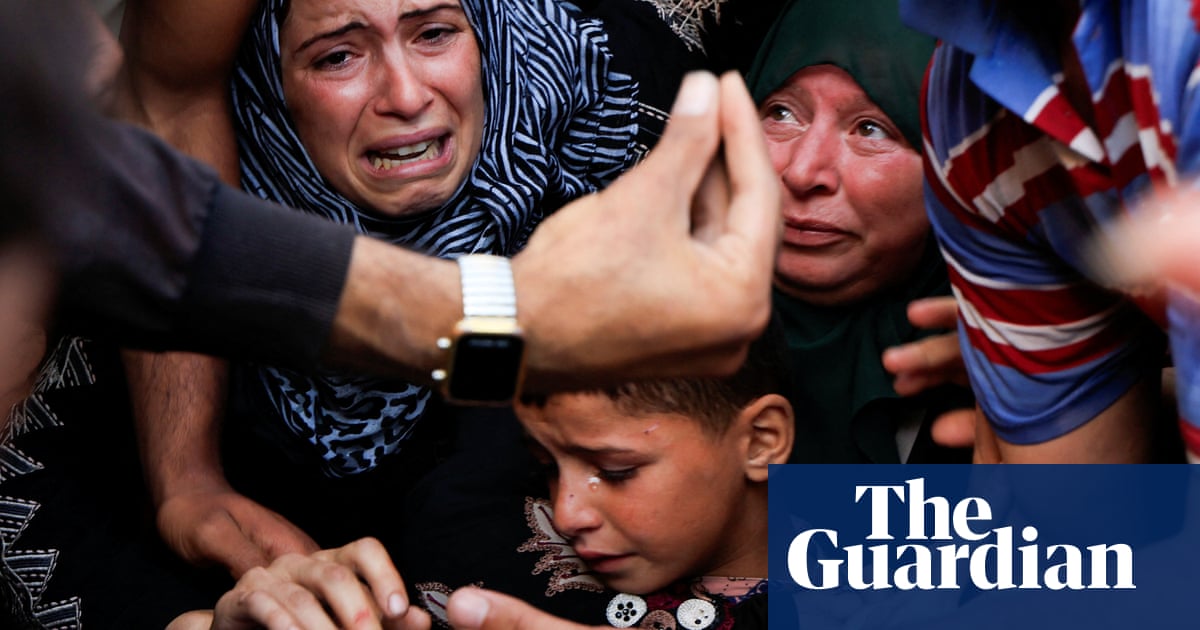At least 16 people have been killed in Israeli strikes across Gaza so far on Friday, the territory’s civil defence agency has said, as Israel intensifies its military offensive despite aid agencies warning that the Palestinian population is plunging deeper intomalnutrition and famine.
Mohammed al-Mughayyir, an official with the Hamas-run Gaza civil defence agency, told Agence France-Presse that the attacks, which wounded dozens of people, mainly targeted the centre and south of the territory, bringing the death toll of Palestinians killed by Israeli forces to nearly 70 in less than 48 hours, after 52 people were killed on Thursday.
The Israeli army said that over the past day its forces had attacked “military compounds, weapons storage facilities and sniper posts” inGaza. “In addition, the [air force] struck over 75 terror targets throughout the Gaza Strip,” it said.
UN agencies and the Palestinian Red Crescent are warning of famine after more than three months of anIsraeli blockade on humanitarian aid.
“In the last couple of days we lost 29 children,” the West Bank-based Palestinian Authority health minister, Majed Abu Ramadan, told reporters, describing them as “starvation-related deaths”. He later clarified that the total included elderly people as well as children.
The Palestinian Authority has partial control over the West Bank, which has been occupied by Israel since 1967, but Hamas has ruled the Gaza Strip since 2007.
Food aid is expected to start reaching Palestinians inGazathis week after Israel began allowing limited goods through after nearly 11 weeks in the face of global pressure to lift the blockade.
A total of 107 aid trucks belonging to the UN and other aid groups carrying flour, food, medical equipment and pharmaceuticals were transferred on Thursday into the strip, the Israeli military said on Friday.
UN agencies have said that the amount of aid entering Gaza is far short of what is required to ease the crisis. Photos and videos of emaciated Palestinian children have caused outrage around the world, with Israel accused of violating humanitarian law by starving civilians.
Earlier this month,the Integrated Food Security Phase Classification (IPC) estimatedthat nearly 71,000 children under the age of five were expected to be “acutely malnourished”, with 14,100 cases expected to be severe, over the next 11 months.
Israel imposed the blockade on all supplies in March, saying Hamas was seizing deliveries for its fighters – a charge the group denies. This montha global hunger monitor said that half a million people in the Gaza Strip faced starvation.
The UN humanitarian aid organisation for children, Unicef, says more than 9,000 children have been treated for malnutrition in Gaza this year, and food security experts say tens of thousands of cases are expected in the coming year.
“We are witnessing, in real time, the creation of conditions for the eradication of Palestinian lives in Gaza,” said the aid agency Médecins Sans Frontières (MSF). ‘‘The obstruction of humanitarian aid is a direct violation of UN security council resolution 2720, which calls for the unimpeded delivery of humanitarian aid to civilians.’’
The Israeli prime minister, Benjamin Netanyahu, who vowed that the entire Gaza Strip would be under Israeli security control by the end of the war, said his plans for private US companies to deliver aid would prevent a humanitarian crisis, despite aid agencies and many governments saying such a crisis already exists.
Meanwhile, in Israel, Netanyahu’s decision to tap the Israel Defense Forces’ Maj Gen David Zini to lead the domestic intelligence agency, Shin Bet – after months of legal and political wrangling over his attempt to sackRonen Barfrom the role – has drawn threats of a legal challenge.
Netanyahu said on Friday his pick for the next domestic intelligence chief should be appointed “as soon as possible”.
Bar, who was sacked by Netanyahu in March because of an “ongoing lack of trust”, had been investigating the prime minister’s close aides for alleged breaches of national security, including claims of leaking classified documents to foreign media and allegedly taking money from Qatar, which is known to have given significant financial aid to Hamas.
On Wednesday Israel’s supreme court ruled as unlawful the government’s decision in March to fire Bar, a move that had triggered mass protests in the country.
Netanyahu believes “it is imperative to name a permanent head of the Shin Bet as soon as possible”, according to a statement from the prime minister’s office. “It is a security requirement of the highest order, and any delay infringes on the security of the state as well as that of our soldiers.”
The statement also noted the investigation into alleged Qatari influence involving advisers to the prime minister, which the attorney general, Gali Baharav-Miara, has suggested created a conflict of interest in Netanyahu’s attempt to fire Bar. Netanyahu’s office said that “to avoid any suspicion linked to the inquiries concerning Qatar, the prime minister clarifies that the appointed head of the Shin Bet will not be involved at all in these investigations”.
Bar has suggested that his ouster was linked to investigations into Hamas’s deadly 7 October 2023 attack on Israel “and other serious matters”.
